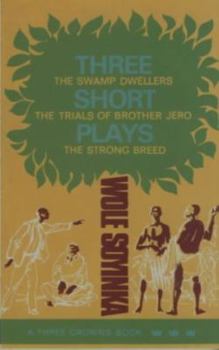Three Short Plays: "Swamp Dwellers", "Trials of Brother Jero", "Strong Breed" (Three Crowns Books)
Select Format
Select Condition 
Book Overview
No Synopsis Available.
Format:Paperback
Language:English
ISBN:0194185265
ISBN13:9780194185264
Release Date:January 1984
Publisher:Oxford University Press
Length:124 Pages
Weight:0.35 lbs.
Customer Reviews
1 rating
Prophetic plays
Published by Thriftbooks.com User , 15 years ago
The three plays date from the early 1960s and constitute a condemnation of religious practice from three points of view. The plays are "The Swamp Dwellers," "The Trials of Brother Jero" and "The Strong Breed." It is not clear whether the plays were written to be played against each other (they were originally published along with two others), but they share so many elements that it would be possible to diagram them as a matrix. Taking them in order, for convenience, as A, B and C, we can list the elements shared by two or more: Disgruntled woman, B & C; stranger, A & C; water, A & C; sacrifice, A & C; leaving the village, A & C; father and son, A & C; contribution, A & B, etc. In "The Swamp Dwellers," Igwezu loses all that is important to him and as a result rejects his village deity, a swamp god. A beggar from the north, a Muslim, also loses everything in a drought and seeks water. The little play is a riot of contrasts: swamp/desert; family/solitude; obligation/rejection; despair/hope. The Muslim does not, unlike Igwezu, explicitly reject his religion, but by voluntarily (and mysteriously) making himself the slave of Igwezu he seems to be creating a solipsistic creed for himself alone. The serpent-priest, Kadiye (who has everything), stands as a materialistic foil to these two. Kidiye, though he makes a good thing out of religion is, at least, apparently a believer. Brother Jeroboam is a cheerful fraud of a prophet. "The Swamp Dwellers" is dark, and "The Strong Breed" is very dark, but "The Trials of Brother Jero" is a comic romp. "The Swamp Dwellers" would be difficult to stage -- all of Soyinka's plays that I have read include instructions to the actors that would be next to impossible to fulfill; they are page-plays and not often performed, at least in America. The two dark plays bookend "Brother Jero," with its cast of cheerful con artists, each presenting a variety of self-sacrificing idealists and teachers or one sort or another. And not only self-sacrificing. Being sacrificed is not something unknown in Nigeria (the first published African novelist, Amos Tutuola, was said to be the son of a priest who had conducted human sacrifices as late as around 1910. Only about 15 years separates Tutola's unself-conscious "The Palm-wine Drinkard and His Dead Palm-wine Tapster in the Dead's Town" from Soyinka's very self-conscious plays). Soyinka has gone a little crazy in his old age, but his plays from the `60s were prophetic: Nigeria has turned out to be as corrupt as Brother Jero, and as violent and intolerant as the villagers in "The Strong Breed." In 2007, Soyinka, looking back at the sweep of African history, said that Christianity and Islam were responsible for much of Africa`s misery. It's been a constant theme with him.




